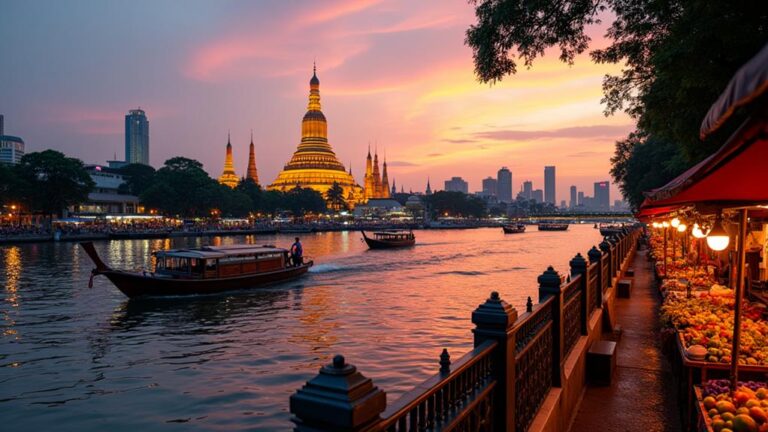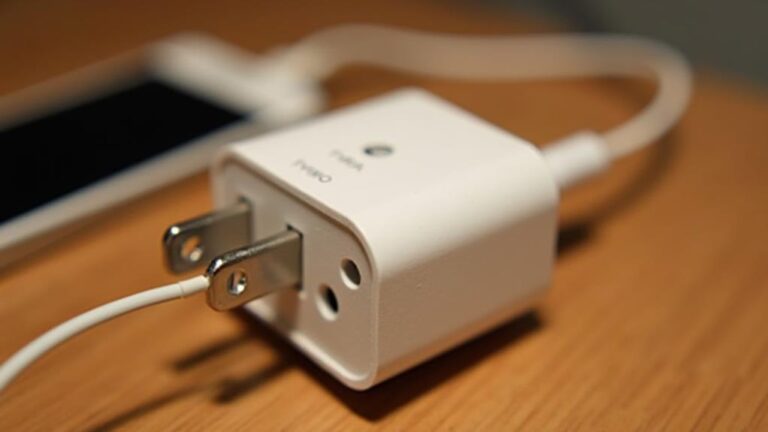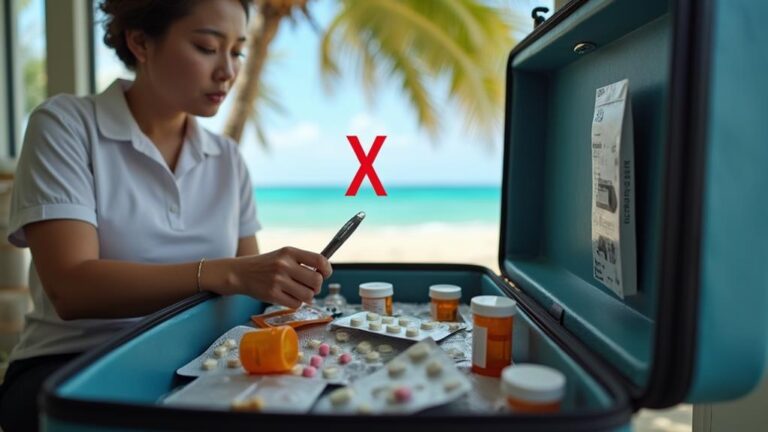To stay safe in Thailand, prioritize your health by getting necessary vaccinations and being cautious about food and water. Guard against theft by keeping valuables secure and staying alert in crowded areas. Respect local customs, dress modestly, and remove shoes when entering homes or temples. Use reputable transportation and practice road safety. Carry emergency contacts, including your embassy's information. Familiarize yourself with visa requirements and local laws. By following these essential tips, you'll minimize risks and enjoy a safer trip to the Land of Smiles. But there's more to ensuring a worry-free Thai adventure.
Table of Contents
Key Takeaways
- Protect against insect-borne diseases by using repellent and covering exposed skin, especially in tropical areas.
- Be vigilant in crowded areas and use money belts to safeguard valuables against theft and pickpocketing.
- Respect cultural norms by dressing modestly, removing shoes when appropriate, and maintaining a friendly demeanor.
- Choose reputable transportation services and prioritize safety by wearing seatbelts or helmets when traveling.
- Ensure food safety by drinking filtered water, eating at popular local spots, and avoiding raw or undercooked meats.
Health and Medical Precautions
Thailand's tropical climate and urban centers present distinctive health challenges for travelers. You'll need to be mindful of various health risks, including insect-borne diseases like dengue and malaria. To safeguard yourself, prioritize vaccination planning before your trip and take precautions against mosquito bites.
Air pollution in certain areas can also pose health risks, so monitor local air quality reports and limit outdoor activities when pollution levels are high. Be cautious of the Zika virus and other tropical diseases by staying informed about current outbreaks.
Medical facilities in Thailand vary in quality, making travel insurance essential for your trip. Confirm your policy covers medical emergencies and evacuation if necessary. If you encounter immediate health concerns, contact the Consular Emergency Centre for assistance.
To stay healthy, practice good hygiene, drink bottled water, and be careful with street food. Consider carrying a basic medical kit for minor ailments. By taking these precautions and staying informed about potential health risks, you'll be better prepared to enjoy your Thai adventure while minimizing health-related issues.
Crime Prevention Strategies
Keep your personal belongings secure at all times to prevent theft and pickpocketing in Thailand. Be especially vigilant in crowded areas and tourist hotspots, where opportunistic criminals often operate.
Familiarize yourself with common scams targeting tourists, such as fake gem deals or rigged tuk-tuk meters, to avoid falling victim to these schemes.
Securing Personal Belongings
When it comes to securing your personal belongings in Thailand, vigilance is key. To stay safe during your travels, it's essential to take proactive measures against theft. Use a money belt or hidden pouch to keep your valuables, including cash, cards, and passport, close to your body and out of sight.
In crowded areas, markets, and on public transportation, always keep a watchful eye on your belongings. Don't leave personal items unattended, especially on beaches or in hotel rooms where they're easy targets for thieves. Secure your luggage and hotel room doors with locks to add an extra layer of protection.
Be particularly cautious in tourist hotspots and busy areas, as these are prime locations for pickpockets. When exploring popular places in Thailand, stay alert and keep your belongings close.
Consider carrying only what you need for the day and leaving other valuables in a secure location at your accommodation.
Avoiding Common Scams
While safeguarding your belongings is important, you'll also need to protect yourself from common scams in Thailand. Be vigilant and aware of popular schemes that target tourists, such as the Damaged Boat Scam, Tour Booking Scam, Fake Romance Scam, and Fake Jewels Scam. These scams often involve inflated prices and can leave you out of pocket if you're not careful.
To protect yourself, avoid accepting items from strangers and be cautious in financial dealings. Stay alert and don't let your guard down around overly friendly individuals who may have hidden agendas. Remember that scammers often rely on your politeness or desire to avoid conflict, so don't hesitate to firmly decline offers or walk away from suspicious situations.
When booking tours or making purchases, research prices beforehand to avoid paying inflated rates. Be cautious of anyone pressuring you to make quick decisions or offering deals that seem too good to be true. By staying cautious and informed, you'll greatly reduce your chances of falling victim to common scams in Thailand and guarantee a safer, more enjoyable trip.
Cultural Awareness and Etiquette

How can you make sure you're respecting Thai culture during your visit? Understanding and adhering to local customs is essential for a positive experience in Thailand. Thai culture values respect and kindness in all interactions, so it's vital to be mindful of your behavior and appearance.
To show cultural awareness and respect, follow these key etiquette guidelines:
- Remove your shoes before entering homes, temples, and palaces
- Dress modestly, especially when visiting religious sites
- Smile often and maintain a friendly demeanor
- Keep your feet covered and avoid pointing them at people or sacred objects
- Show kindness and patience in all interactions
By adopting these customs, you'll demonstrate respect for Thai culture and enhance your travel experience. Remember that shoes are considered unclean, so always be prepared to remove them when necessary.
Dressing modestly and maintaining a respectful attitude will help you navigate social situations with ease.
Cultural awareness goes beyond following rules; it's about genuinely appreciating and embracing local traditions. By making an effort to understand and respect Thai customs, you'll not only stay safe but also forge meaningful connections with the local community during your visit.
Transportation Safety Guidelines
When using Thailand's transportation options, prioritize your safety by following key guidelines.
On the roads, be vigilant and cautious, especially when crossing streets or riding motorcycles.
For public transport, stay alert for pickpockets and use reputable services like Grab or metered taxis to avoid overcharging.
Road Safety Precautions
Road safety in Thailand can be a major concern for travelers. With high rates of accidents, it's important to take precautions when traveling on the country's roads. Opt for safer alternatives like public transportation whenever possible. Buses, BTS, and MRT systems offer reliable and secure options for getting around.
If you choose to use taxis or ride-hailing services like Grab, be aware of potential overcharging. Always insist on using the meter or agree on a fare before starting your journey. When using public transportation, stay vigilant and keep your belongings secure to avoid falling victim to pickpockets.
Here are five essential road safety tips for travelers in Thailand:
- Always wear a seatbelt or helmet when in vehicles or on motorcycles
- Be cautious when crossing streets, as traffic rules may not be strictly enforced
- Avoid riding in overcrowded vehicles or on the back of pickup trucks
- Don't drink and drive or ride with impaired drivers
- Use reputable transportation services and avoid unlicensed operators
Public Transport Tips
While exploring Thailand, public transportation offers a safe and efficient way to navigate the country. You'll find a variety of options, including buses, BTS (Skytrain), MRT (subway), and tuk-tuks, which provide convenient and cost-effective travel throughout major cities and regions.
When using public transportation, remain vigilant and keep your belongings secure to prevent pickpocketing incidents. Be cautious of potential overcharging by taxi drivers, especially in tourist areas. To avoid this, consider using ride-hailing services like Uber, which has merged with Grab in Thailand, for reliable and fair-priced transportation.
The BTS and MRT systems in Bangkok are particularly efficient and well-maintained, offering a quick way to bypass traffic congestion. Buses are widely available and cover extensive routes, but may be more challenging to navigate for non-Thai speakers. Tuk-tuks can be a fun and uniquely Thai experience, but agree on the fare before starting your journey.
When planning your itinerary, factor in the safety and convenience of public transportation options. By utilizing these services, you'll not only save money but also experience Thailand like a local while minimizing travel-related risks.
Food and Drink Considerations

Safety is paramount when it comes to food and drink in Thailand. To avoid stomach issues and waterborne diseases, opt for bottled water or drinks made with boiled water instead of tap water. When exploring Thailand's vibrant street food scene, confirm the food is cooked fresh and in hygienic conditions to prevent food poisoning. Eating where locals dine can often lead to better food quality and reduce health risks.
Here are five essential tips for food and drink safety in Thailand:
- Carry a water bottle with a built-in filter for safe drinking water
- Choose street food vendors with high turnover and clean preparation areas
- Eat at popular local restaurants to verify fresher ingredients
- Avoid raw or undercooked meats and seafood
- Wash your hands frequently or use hand sanitizer before meals
Be cautious about consuming food from unknown or unhygienic sources to protect yourself from food-related illnesses. By following these guidelines, you'll be able to safely enjoy Thailand's delicious cuisine while minimizing health risks. Remember, staying vigilant about food safety doesn't mean missing out on authentic Thai flavors – it just means making informed choices to ensure a memorable and healthy travel experience.
Emergency Contacts and Resources
Being prepared for emergencies is necessary when traveling in Thailand. Save the emergency contact numbers for fire and rescue services, medical emergencies, and police on your phone. Familiarize yourself with local resources for immediate assistance in case of unexpected situations.
As an Australian traveler, it's vital to have the contact information for the Australian Embassy and Consulate-General in Thailand readily available. In urgent situations, reach out to the Consular Emergency Centre for support and guidance. Stay informed about safety updates and travel advice by signing up for notifications from official government sources.
| Emergency Service | Contact Number |
|---|---|
| Fire and Rescue | 199 |
| Medical Emergency | 1669 |
| Police | 191 |
Legal Matters and Visa Information

Travelers must acquaint themselves with Thailand's stringent legal system and visa requirements before their trip. Thailand enforces severe penalties for drug offenses, commercial surrogacy, and e-cigarettes. The death penalty remains in place for serious crimes and offenses against the monarchy. Be mindful of local laws, including spot-checks for illegal drugs and strict visa regulations.
Understand visa exemptions and biometric screening procedures to avoid issues upon arrival. Overstaying your visa can result in substantial fines, so keep track of your permitted stay. Dual nationals should adhere to local laws and customs while being attentive to passport validity and identification requirements.
Key points to remember:
- Acquaint yourself with Thailand's visa regulations and exemptions
- Verify your passport is valid for at least six months beyond your planned stay
- Carry proper identification at all times
- Be aware of strict penalties for drug offenses and other crimes
- Respect local laws and customs, especially regarding the monarchy











